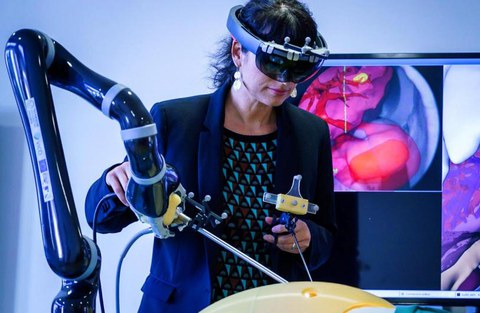Specialization in Medical Informatics
The Bachelor's degree course in Applied Computer Science with a specialization in Medical Informatics will be offered for the first time in the winter semester 2025/26.
General information about the Medical Informatics specialization
Medical informatics is essential for the future of healthcare. It optimizes clinical processes, improves diagnoses and enables personalized therapies through digital technologies such as artificial intelligence, big data and telemedicine. Electronic patient records, decision support systems and medical image processing increase the efficiency and safety of patient care.
A degree in Medical Informatics qualifies students for sought-after professions at the interface of IT and medicine. In an increasingly digital healthcare landscape, specialists are in demand who develop innovative IT solutions to ensure better, faster and safer healthcare - and thus actively shape the medicine of tomorrow.
Content of the degree program
The Bachelor's degree program in Medical Informatics provides theoretical and methodological foundations in the core areas of informatics, medical informatics and health sciences. Students acquire knowledge in the development, application and optimization of IT systems for the healthcare sector, including topics such as medical information systems, biometrics, image processing and biosignal processing.
The course content includes:
- Fundamentals of Medical Informatics: introduction to medical information systems, electronic health records, medical biometrics, image processing and biosignal processing.
- Information systems in healthcare: Architecture and use of medical information systems in hospitals and private practices, health telematics, telemedicine and interoperability.
- Biometrics and epidemiology: statistics, planning and analysis of clinical studies, bioinformatics and epidemiological research methods.
- Biosignal and image processing: fundamentals of digital image processing in medicine, filtering methods, segmentation, classification and biosignal processing.
- Business processes & IT management: Design, analysis and optimization of medical work processes through IT, IT security management, risk management and service management in the healthcare sector.
What can I do after graduation?
Career prospects
As a graduate in Medical Informatics, you will play an active role in shaping digitalization in the healthcare sector. The areas of employment are diverse: medical computer scientists are sought-after specialists in software, pharmaceutical and medical technology companies as well as in clinics, health insurance companies, research institutions and public authorities.
Typical activities include:
- Development and operation of medical software and apps
- Analysis and optimization of clinical processes
- Support in diagnostics and therapy through data-based procedures
- Implementation and maintenance of electronic patient records and hospital information systems
- Development and application of artificial intelligence in medical image and biosignal processing
- Research and innovation in the field of telemedicine and mobile assistance systems
AI-supported diagnostic systems, smart assistance technologies and data-driven healthcare solutions will play an even greater role in the future, making this profession particularly future-proof.
Further degree programs
If you want to specialize further or deepen your scientific knowledge, you can go straight on to a Master's degree in (Media) Computer Science or the Biomedical Engineering degree course at TU Dresden. A Master's degree also opens up career opportunities in management positions, higher administration and research - right up to a doctorate and an academic career.
Why study Medical Informatics at TU Dresden?
There are many good reasons to choose to study at the TUD Dresden University of Technology. With over 30,000 students, it is one of the largest technical universities in Germany and has been one of the Universities of Excellence since 2012. TU Dresden offers an excellent academic education with a strong interdisciplinary focus - ideal for a forward-looking subject such as Medical Informatics.
What makes studying at TU Dresden so special:
- Excellent teaching and research - linking computer science, medicine and health sciences
- Strong practical orientation - cooperation with clinics, research institutions and industry partners
- Internationality - exchange programs with leading universities worldwide
- Family-friendly university - numerous support services for students with children
- Modern facilities - access to the latest technologies and innovative research laboratories
Dresden is one of the most liveable cities in Germany - a perfect mix of science, culture and nature.
- Historic old town & creative trendy districts - From magnificent baroque buildings to the modern new town, Dresden offers a unique atmosphere.
- Green oases - With numerous parks, the River Elbe and nearby Saxon Switzerland, Dresden is one of the greenest cities in Europe.
- Cultural diversity - Theaters, museums, concerts and festivals provide a varied range of leisure activities.
- Lively nightlife - Countless bars, clubs and student pubs make Dresden particularly attractive for young people.
- Perfect connections - cities such as Berlin, Prague and Wrocław are within easy reach and are perfect for weekend trips.
Studying at TU Dresden not only offers first-class career opportunities, but also a great time studying in one of the most beautiful cities in Germany.
Contact and advice
Do you have any questions about studying or applying? Our contact persons will be happy to help you.
 © Martin Sedlmayr
© Martin Sedlmayr
Professor für Medizinische Informatik
NameMr Prof. Dr. rer. nat. Martin Sedlmayr
Send encrypted email via the SecureMail portal (for TUD external users only).
